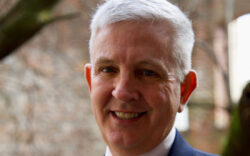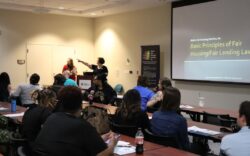The ACC Public Safety Civilian Oversight Board has recently expressed a sense of distrust and dismay with, in the words of one board member, the “bureaucratic evasiveness” of some elected officials who have denied their request to be present during relevant job interviews, have failed to guarantee the board a minimum staffing level or a dedicated budget, and, in their view, seem content to allow the ACC Police Department to police itself.
The ACC Commission created the Public Safety Oversight Board in 2021 to investigate complaints about alleged police misconduct and to review ACCPD internal investigations. The goal of the board is to provide accountability for ACCPD and other agencies and therefore help to improve community trust in law enforcement.
Civilian oversight of police has been a goal for activists at the Athens Anti-Discrimination Movement for years, but the idea hasn’t always been viewed positively by police or by local conservative groups. For example, former ACC Police Chief Cleveland Spruill stridently objected to the oversight board at first, but withdrew his objections after some changes were made to the proposed ordinance. Members of the Athens Republican Party have also spoken out against the board during public comment in recent years.
The ACC Commission voted unanimously to create the police oversight board in 2021, but the ordinance did not specify the hiring of any new staff members to support the oversight board. At that time, commissioners wanted to wait until after the board was formed so they could be advised about the number of full-time staff members the board felt would be appropriate. Today, the oversight board would be lucky to get even one dedicated, part-time staffer to support their work.
The Public Safety Civilian Oversight Board (PSCOB) has been meeting for about a year. In that time, they’ve received training from police, worked on their bylaws and decided on recommendations for their yet-to-be-hired staff assistant, a position known as the “monitor.”
Cassie Evans, chair of the PSCOB, told Athens Politics Nerd that her board drafted a job description for a full-time monitor position and passed it onto the ACC Commission’s Government Operations Committee. This committee will change the job description as they see fit before passing it on to the full commission for adoption.
Evans said the oversight board recommended that anyone with prior affiliation to ACCPD, the sheriff’s office or any other division of ACC law enforcement not be considered for the monitor position, because “there is a chance that they would side with the people they are investigating.” However, during the most recent GOC meeting, there was broad agreement among commissioners that this conflict-of-interest clause would be removed from the monitor’s job description.
The monitor will likely become a part of the Office of Operational Analysis and would fall under the purview of the new internal auditor, when one is finally hired. That position is currently vacant, and the commission will be interviewing candidates later this year. Since the internal auditor has an array of other duties, far beyond acting as a monitor of the police department, Commissioner Patrick Davenport, the GOC chair, said he is reluctant to narrow the pool of applicants.
The oversight board is asking for at least one full-time monitor to support their work. However, at the last GOC meeting, Commissioner Mike Hamby questioned whether the monitor should be a full-time position. He wondered if there would be enough work to support a full-time monitor, given that ACCPD only received seven formal complaints last year.
Commissioner Dexter Fisher, who is the commission’s representative on the PSCOB, agreed with Hamby. “Will there be enough complaints out there for the monitor to really have a full-time job?” Fisher asked. “I have not seen any of the complaints.”
According to Evans, the number of complaints might be low because people may feel uncomfortable complaining about the police to the police. “If they make a complaint, then they are afraid that the police officers will retaliate against them,” Evans said.
Lee Reid, executive director of the Atlanta Citizen Review Board, gave a presentation to his counterparts in Athens earlier this month in which he recommended two full-time positions for the Athens board, at a minimum. “You can’t do this work off the side of your desk,” Reid said. “This can be complex work that requires daily attention.” The Atlanta oversight board has eight full-time staff members, including Reid, and is authorized to have as many as 12.
“We’re not being set up for success,” Evans said. “If there isn’t a person working full-time for this board, it will ultimately fail. That happened in Memphis. All of the people working on their oversight board were volunteers, and it ultimately failed.”
The PSCOB has also made the extraordinary request that they be allowed to sit in on interviews for the internal auditor, which is an officer position listed in the ACC Charter and reports directly to the mayor and commission. Mayor Kelly Girtz denied this request.
While Girtz offered to ask any question the oversight board wants him to ask during the interviews for internal auditor, the board does not seem to trust that Girtz will ask their questions. “We’re rooted in the trust of the community,” Evans pleaded. “We’re not saying we want to be the ones asking the questions, but we want to be able to observe at least. If we’re missing from that process, there’s a disconnect there.”
In Atlanta, Reid said, not only does the oversight board sit in on staff interviews, but they run those interviews and even do the hiring themselves.
After their January meeting, oversight board members were left feeling discouraged and dismayed. They said they felt “hopeless,” that things were “out of our control,” and even that the entire oversight board was “a facade.”
Fisher said he is concerned about the lack of trust shown by some members of the oversight board. “I want them to be successful,” Fisher said. “If mistrust is there, then we’ve got to gain that trust. We’ve got to work together and make it better.”
Like what you just read? Support Flagpole by making a donation today. Every dollar you give helps fund our ongoing mission to provide Athens with quality, independent journalism.










